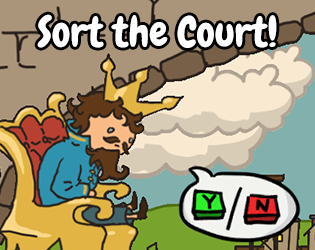

They will collect Council Tax arrears and unpaid parking fines for local authorities, and money owed to Her Majesty’s Revenue and Customs (HMRC), but might be employed by any creditor to collect the debt.The Concur for Mobile app integrates with KU's Concur travel system, allowing you to manage travel expenses wherever you are. Private: They can be self-employed, employed by a private firm or employed by another organisation. Short codes are designed to be easier to read and remember than telephone numbers. Perhaps you have been missing mortgage payments.Short codes, or short numbers, are short digit sequences, significantly shorter than telephone numbers, that are used to address messages in the Multimedia Messaging System (MMS) and short message service (SMS) systems of mobile network operators.In addition to messaging, they may be used in abbreviated dialing. Woman outside a courthouse.
Sort The Court For Mobile Download Sort The
County Court bailiff:They are directly employed by the County Court to collect unpaid County Court Judgments (CCJs) and must follow guidelines laid down by the Lord Chancellor’s Department. Sort the Court Sort the Court Heavy is the head that wears the crown, especially in this crazy kingdom Download Sort the Court Sort the Pile. In the Custom Lists box, select the list that you want, and then click OK to sort the worksheet.Mobile, AL. From the Order drop-down, select Custom List. For example, if you want to re-sort the previous example by delivery date, under Sort by, choose delivery. In the Sort popup window, in the Sort by drop-down, choose the column on which you need to sort.
They mainly deal with money owed in criminal offences.The above are all ‘certificated bailiffs’, which means they are granted a certificate following application to a County Court. Magistrates Court bailiff: They work for the Magistrates Court and are responsible to the clerk of the court. If a creditor has a County Court Judgment (CCJ) of more than £600 (including court costs) they can transfer the judgment to the High Court for enforcement – unless it is a debt regulated by the Consumer Credit Act, as these can only be enforced through the County Court. They work out of the local Sheriff’s Office under the control of an Under-Sheriff who is usually responsible for that area.
A new security must be provided if the old security runs out or is reduced.Some collection agencies may threaten to send someone to your home if you refuse to pay them the amounts they request. And they must lodge in court a bond or deposit for £10,000, or have an insurance indemnity for this amount. A ‘fit and proper person’ to hold a certificate and possesses sufficient knowledge of the law of distress,


A bailiff can only ever visit your home 7 days after they’ve issued you with a Notice of Enforcement. When you seek advice make sure you have all the necessary papers informing you of the bailiff action, as well as (if they have already visited) any documentation left by them.If you know a bailiff is going to call, try to have a witness there and make sure you note down everything that is said or any of the powers they claim to have. If you cannot suspend the action, it may not be too late to make an offer to repay the debt over a period of time.You can discuss this without letting the bailiff into your home, although you may feel awkward discussing such matters in public.If you cannot afford to make an offer your local CAB may be able to help by negotiating with the bailiff on your behalf. Alternatively you may be able to make an application to the court to suspend the bailiff’s action. Following goods: Where entry was gained from a different property and made a levy, and they are now following the goods.If you are worried about a bailiff forcing entry to your property and are expecting a visit, contact PayPlan on 08 for free advice.If you have received a Notice of Enforcement telling you a bailiff is going to call at your house, you may be able to negotiate some sort of repayment to the lender (your creditor) before they call.Make sure you know who your creditor is, because it’s possible your original creditor could have already sold the debt to a debt recovery agency.
In some cases, you can receive up to six weeks.This type of order means you’re allowed to continue living in the property but you must meet certain conditions – which could include having to pay back any rent you owe on a weekly basis. If you have small children or disabled relatives living under your care, you may be able to apply for more time from the court. The types of court orders that a landlord can get include:This means you must leave your property by a certain date and if you have not left by this time, bailiffs will be sent to evict you. How long does a bailiff eviction take?To get evicted from your home, your landlord has to have been granted a court order to legally remove you from the house. Once they have gained entry, they may also force entry to any other parts of the premises. Walking into your house unannounced may not be polite, but it is entry by ‘peaceable means’.This is the reason why you should close and lock all your doors and windows if you think you may be due a visit.
You will need to give them any keys you have to the property and you will also need to take your belongings with you.You won’t be given any extra time to pack your things once the bailiffs arrive, so you should try to move out as much as possible before your eviction date. This could be with a friend or relative – or you could speak to your local council about your situation and see if they are able to help.When the bailiffs arrive on the day of eviction they will ask you to leave the property. This notice is called an N54 form and is either sent as a written letter or hand delivered.Once this notice has been received, you should look into finding somewhere to live. If you do not leave the property during this time, your landlord will apply to court for bailiffs to assist with encouraging you to leave your home.You should also be given a few days’ notice before they actually arrive to prepare. How long does it take before bailiffs are involved in an eviction?You usually have 14 days after the court makes the order for eviction before bailiffs are involved. We have more information around these here.
Use the door chain if you have one. Don’t open your door to them. Keeping the bailiffs outIn order to keep the bailiffs out, especially on their first visit: You could be charged for storage costs though.
What rights do I have?You cannot be sent to prison for not co-operating with a bailiff. What will happen if I am not home?If you are not home then a bailiff will attempt to gain ‘peaceable entry’ if a family member is in – and they may force entry if collecting unpaid fines of a criminal nature, VAT or if they have been before.If it is their first visit and they are unable to force entry, they may look through your windows to make a list of goods they intend to seize and will leave a letter to say they have attempted a visit. This is a problem that will not just go away, and so in the long term you should seek help. Inform family members who you live with about the visit to ensure they don’t let them in, otherwise this would count as ‘peaceable entry’.If you have locked your door and then decide to open it to talk to the bailiff, you still do not have to let them in (if they have not previously entered).They may make an effort to enter, but if you stand your ground they are not permitted to force their way past you (although they are permitted to do so as a last resort if collecting unpaid criminal fines, Income Tax or VAT).If you do refuse to let them in then they will be sure to return at some other time.


 0 kommentar(er)
0 kommentar(er)
